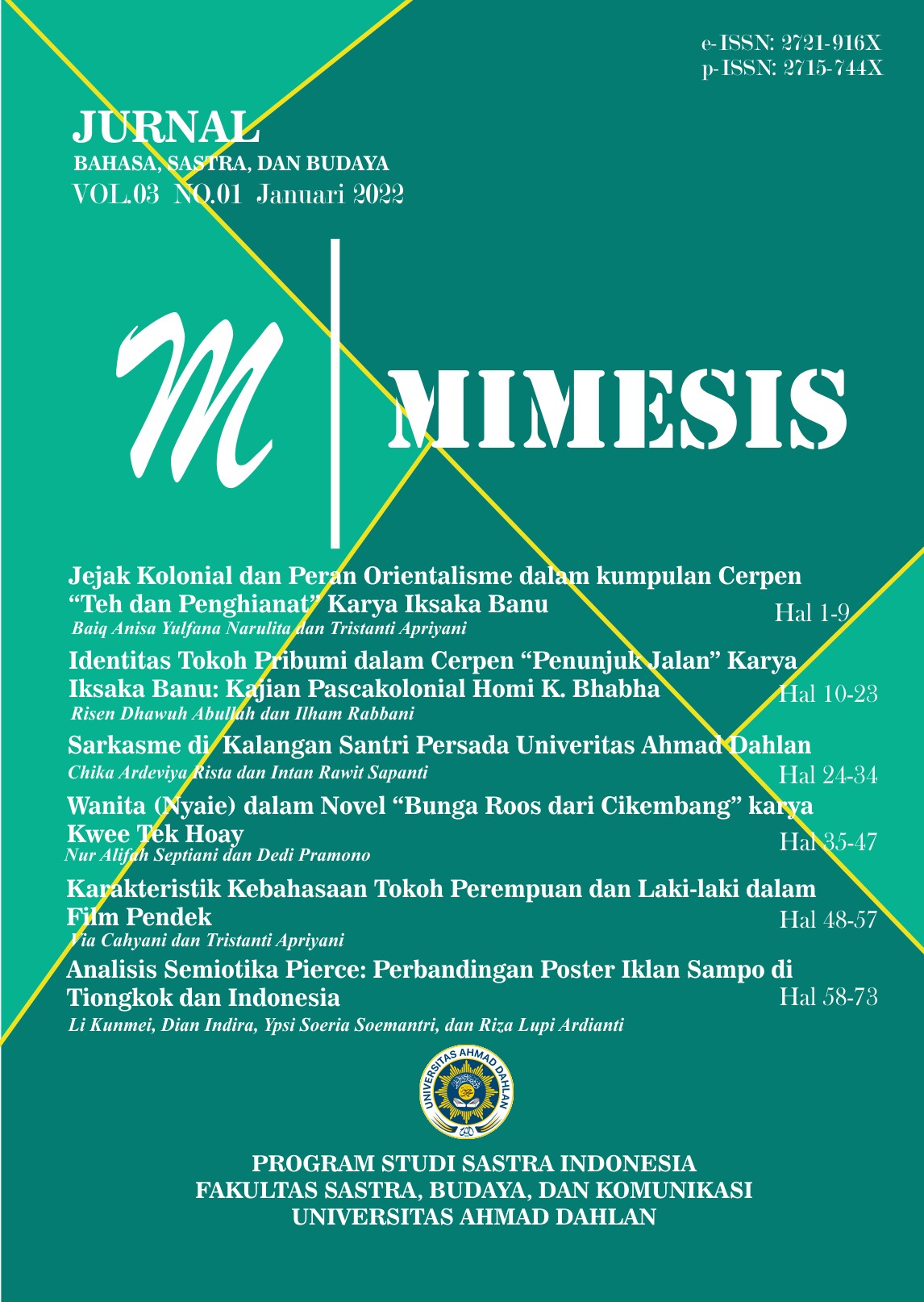IDENTITAS TOKOH PRIBUMI DALAM CERPEN PENUNJUK JALAN KARYA IKSAKA BANU: KAJIAN PASCAKOLONIAL HOMI K. BHABHA
DOI:
https://doi.org/10.12928/mms.v3i1.5247Keywords:
Identity, Iksaka Banu, Hybridity, Mimicry, Ambivalence, Postcolonial, BhabhaAbstract
This study aims to uncover an Indigenous character named Oentoeng in the short story “Penunjuk Jalan”. The short story is one of Iksaka Banu's works contained in the book Semua untuk Hindia. The identity of the character that is trying to be dismantled includes hybridity, mimicry, and ambivalence. The theory used in this study is the postcolonial theory initiated by Homi K. Bhabha. The study used a qualitative descriptive method. There are three findings in this study. First, the identity of Oentoeng is a hybrid. Oentoeng absorbs Western values continuously, namely from his upbringing, education, and his association in the Dutch family environment. Second, mimicry as mockery by the character can be seen from three aspects, specifically the ability to speak Dutch, possess Western medical knowledge, and to be able to devise a strategy of rebellion that made the VOC troubles as invaders. Third, Oentoeng's attitude of wanting to be angry and willing to provide assistance, treatment, and entertainment to the Dutch doctor and his porter who had an accident could be interpreted as a form of ambivalence in the Indigenous character.
References
Althusser, Louis. 2007. Filsafat sebagai Senjata Revolusi. Yogyakarta: Resist Book.
Banu, Iksaka. 2014. Semua untuk Hindia. Jakarta: Kepustakaan Populer Gramedia.
Bhabha, Homi K. 1994. The Location of Culture. New York: Routledge Classics.
Day, Tony, and Keith Foulcher. 2008. “Bahasan Kolonial dalam Sastra Indonesia Modern: Catatan Pendahuluan.” P. 468 in Sastra Indonesia Modern Kritik Postkolonial. Jakarta: Yayasan Obor Indonesia.
Fajar, Yusri. 2011. “Negosiasi Identitas Pribumi dan Belanda Dalam Sastra Poskolonial Indonesia Kontemporer.” Literasi 1(2):178–86.
Faruk. 2007. Belenggu Pascakolonial: Hegemoni & Resistensi dalam Sastra Indonesia. Yogyakarta: Pustaka Pelajar.
Faruk. 2017. Metode Penelitian Sastra: Sebuah Penjelajahan Awal. Yogyakarta: Pustaka Pelajar.
Fiaji, Noveria Anggraeni, Fitrahayunitisna, dan Prisca Kiki Wulandari. 2020. “Potret Nilai Nasionalisme dalam Kumpulan Cerpen Semua untuk Hindia Karya Iksaka Banu.” Kode 9(4).
Foulcher, Keith. 2008. “Larut di Tempat yang Belum Terbentuk Mimikri dan Ambivalensi Dalam Sitti Noerbaja Marah Rusli.” Dalam Sastra Indonesia Modern: Kritik Postkolonial. Jakarta: Yayasan Obor Indonesia.
Heryanto, Ariel. 2015. “Indonesia dalam Indo: Menghargai Semua untuk Hindia.” Indoprogress.Com. Retrieved June 10, 2021 (https://indoprogress.com/2015/04/indonesia-dalam-indo-menghargai-semua-untuk-hindia/).
Kamus Besar Bahasa Indonesia (KBBI) Daring. "Ideologi". Retrieved November 18, 2021 (https://kbbi.kemdikbud.go.id/entri/ideologi).
Khuzaini, A. H. 2018. “Kepribadian dan Aktualisasi Diri Tokoh Utama dalam Kumpulan Cerpen Semua untuk Hindia Karya Iksaka Banu (Kajian Psikologi Sastra).” EDU-KATA 5(2):115–22.
Kuntowijoyo. 2006. Budaya dan Masyarakat. Yogyakarta: Tiara Wacana.
Loomba, Ania. 2016. Kolonialisme/Pascakolonialisme. Yogyakarta: Narasi.
Moleong, Lexy J. 2018. Metodologi Penelitian Kualitatif. Bandung: PT. Remaja Rosda Karya.
Raditya, Iswara N. 2018. “Untung Surapati, Bekas Budak yang Mengawini Perempuan Belanda.” Tirto.Id. Retrieved June 12, 2021 (https://tirto.id/untung-surapati-bekas-budak-yang-mengawini-perempuan-belanda-cFj3).
Setiawan, Rahmat. 2018. Pascakolonial: Wacana, Teori, dan Aplikasi. Yogyakarta: Gambang Buku Budaya.
Stroomberg, J. 2018. Hindia Belanda 1930. Yogyakarta: IRCiSoD.
Suweleh, Fadlun. 2020. “Tokoh-tokoh Nativephilia dalam Antologi Cerpen Semua untuk Hindia Karya Iksaka Banu: Analisis Pascakolonial Homi K. Bhabha.” Jentera 9(2):199–215.
Turama, Akhmad Rizqi. 2017. “Ambivalensi dalam Cerpen 'Anak Ini Mau Mengencingi Jakarta?' Karya Ahmad Tohari: Kajian Poskolonialisme.” Eufoni 1(1).
Wijaya, Guntur S., Achmad Zulfikar N., Alhadisatur Rofiqoh, Dwi Rofikoh, Widayawati, Khusnul Villah, Puji M. Arfi, and Syahrul Ramadhan W. 2019. “Peranan Untung Surapati di Wilayah Mataram dalam Babad Trunajaya-Surapati.” Suluk 1(1):51–58.
Young, Robert J. C. 2003. Postcolonialism: a Very Short Introduction. New York: Oxford University Press.
Downloads
Published
Issue
Section
License
Copyright (c) 2022 Risen Dhawuh Abdullah, Ilham Rabbani

This work is licensed under a Creative Commons Attribution-ShareAlike 4.0 International License.
License and Copyright Agreement
In submitting the manuscript to the journal, the authors certify that:
- They are authorized by their co-authors to enter into these arrangements.
- The work described has not been formally published before, except in the form of an abstract or as part of a published lecture, review, thesis, or overlay journal.
- That it is not under consideration for publication elsewhere,
- That its publication has been approved by all the author(s) and by the responsible authorities tacitly or explicitly of the institutes where the work has been carried out.
- They secure the right to reproduce any material that has already been published or copyrighted elsewhere.
- They agree to the following license and copyright agreement.
Copyright
Authors who publish with Mimesis agree to the following terms:
- Authors retain copyright and grant the journal right of first publication with the work simultaneously licensed under a Creative Commons Attribution License (CC BY-SA 4.0) that allows others to share the work with an acknowledgment of the work's authorship and initial publication in this journal.
- Authors are able to enter into separate, additional contractual arrangements for the non-exclusive distribution of the journal's published version of the work (e.g., post it to an institutional repository or publish it in a book), with an acknowledgment of its initial publication in this journal.
- Authors are permitted and encouraged to post their work online (e.g., in institutional repositories or on their website) prior to and during the submission process, as it can lead to productive exchanges, as well as earlier and greater citation of published work.












